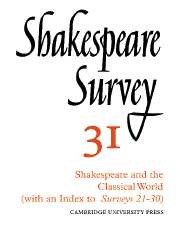Book contents
- Frontmatter
- The Ancient World in Shakespeare: Authenticity or Anachronism? A Retrospect
- ‘A Piece of Skilful Painting’ in Shakespeare’s Lucrece
- Philomel in Titus Andronicus and Cymbeline
- Apuleius and the Bradleian Tragedies
- ‘The Choice of Hercules’ in Antony and Cleopatra
- Structure, Inversion, and Game in Shakespeare’s Classical World
- Truth and utterance in The Winter’s Tale
- Adumbrations of The Tempest in A Midsummer Night’s Dream
- The Old Honor and the New Courtesy: 1 Henry IV
- Henry V: the Chorus and The Audience
- ‘The Devil’s Party’: Virtues and Vices in Measure for Measure
- Shakespeare and the Healing Power of Deceit
- Shakespeare’s Man Descending a Staircase: Sonnets 126 to 154
- A New View of Bankside
- Comedies and Histories at Two Stratfords, 1977
- Tamburlaine the Great Re-discovered
- The Year's Contributions to Shakespearian Study 1 Critical Studies
- 2 Shakespeare’s Life, Times, and Stage
- 3 Textual Studies
- General Index to Surveys 22–30
- Index
- Plate Section
Shakespeare and the Healing Power of Deceit
Published online by Cambridge University Press: 28 March 2007
- Frontmatter
- The Ancient World in Shakespeare: Authenticity or Anachronism? A Retrospect
- ‘A Piece of Skilful Painting’ in Shakespeare’s Lucrece
- Philomel in Titus Andronicus and Cymbeline
- Apuleius and the Bradleian Tragedies
- ‘The Choice of Hercules’ in Antony and Cleopatra
- Structure, Inversion, and Game in Shakespeare’s Classical World
- Truth and utterance in The Winter’s Tale
- Adumbrations of The Tempest in A Midsummer Night’s Dream
- The Old Honor and the New Courtesy: 1 Henry IV
- Henry V: the Chorus and The Audience
- ‘The Devil’s Party’: Virtues and Vices in Measure for Measure
- Shakespeare and the Healing Power of Deceit
- Shakespeare’s Man Descending a Staircase: Sonnets 126 to 154
- A New View of Bankside
- Comedies and Histories at Two Stratfords, 1977
- Tamburlaine the Great Re-discovered
- The Year's Contributions to Shakespearian Study 1 Critical Studies
- 2 Shakespeare’s Life, Times, and Stage
- 3 Textual Studies
- General Index to Surveys 22–30
- Index
- Plate Section
Summary
The mark of the Shakespearian villain is deceit, rather than cruelty, ruthlessness, greed, or ambition (though he may be cruel, ruthless, greedy, ambitious). He is a man who pretends to be working for your good, and he puts on a show of loyalty, affection and honesty, while he is secretly undermining you and plotting your downfall, so that he may get your power or your possessions or your wife, or just so that he may enjoy your ruin. Deceit is the ‘divinity of hell’ which Iago exults in as he plans the ‘honest’ advice which will be the destruction of Othello, Desdemona and Cassio:
When devils will their blackest sins put on,
They do suggest at first with heavenly shows.
(ii, iii, 340–1)The good cry out in indignation against the bad, and Lear in the storm curses the 'caitiff'
That under covert and convenient seeming
Has practised on man's life.
(iii, ii, 56-7)The outrage of deceit is often betokened by the smiling or impassive face:
there's no art
To find the mind's construction in the face.
(Macbeth, i, iv, 11-12)But in Sonnet 94 ('They that have power to hurt and will do none'), it seems to be argued that those whose faces give nothing away can be justified; indeed, that some people who 'do not do the thing they most do show', and are the 'lords and owners of their faces', are specially favoured of Heaven. And indeed, when one thinks about it, 'seeming', the false presentation of the self or of events, concealing what you are and pretending to be what you are not, is a widespread activity among Shakespeare's good characters as well as among his villains. Prince Hal lets it be thought that he is an irredeemable roisterer.
- Type
- Chapter
- Information
- Shakespeare Survey , pp. 115 - 126Publisher: Cambridge University PressPrint publication year: 1979

